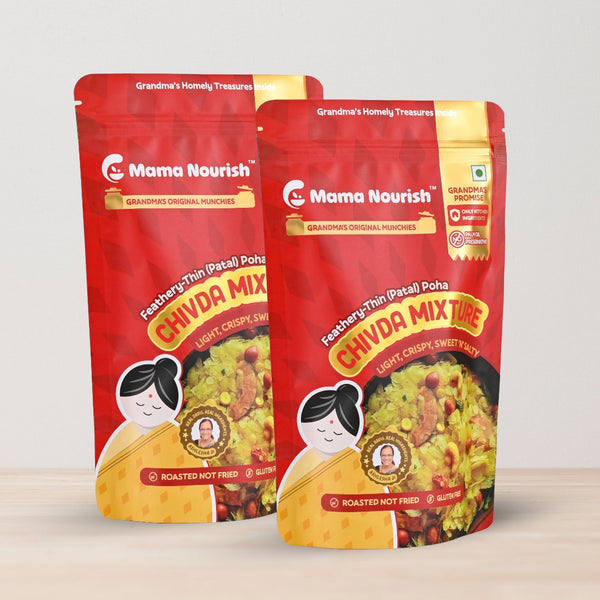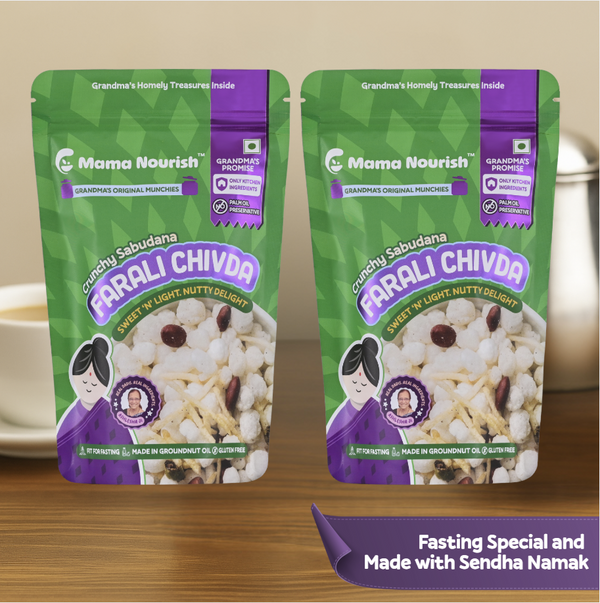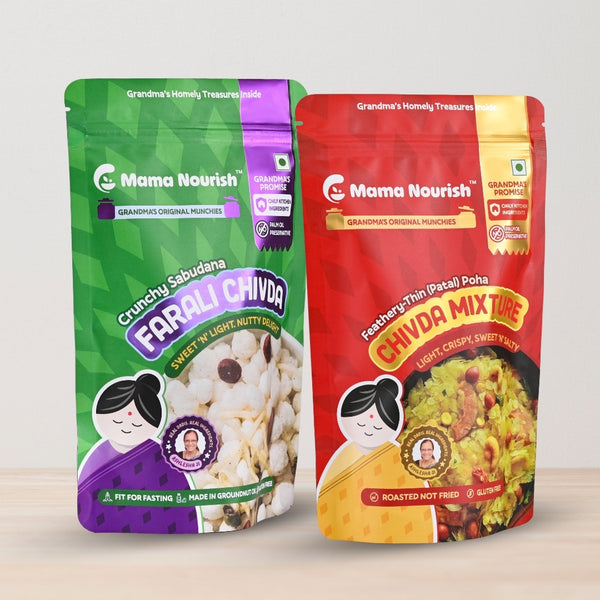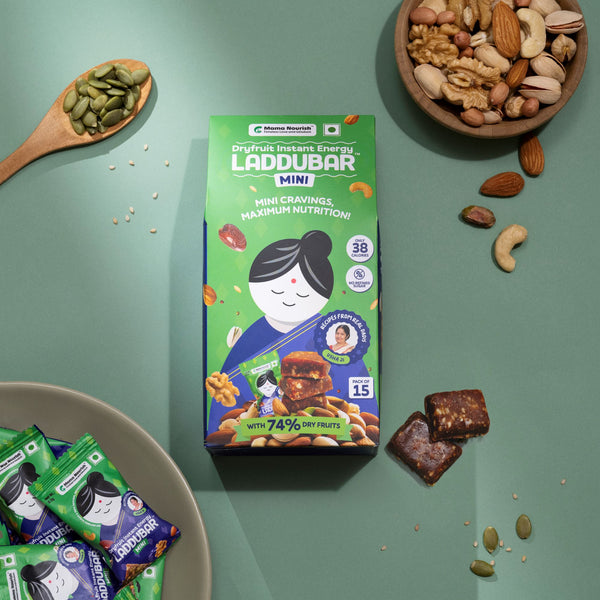Home
>
Nourishing Trails
Grandma's Secret Superfood: Fenugreek Seeds(Methi) Unveiled by Modern Science!
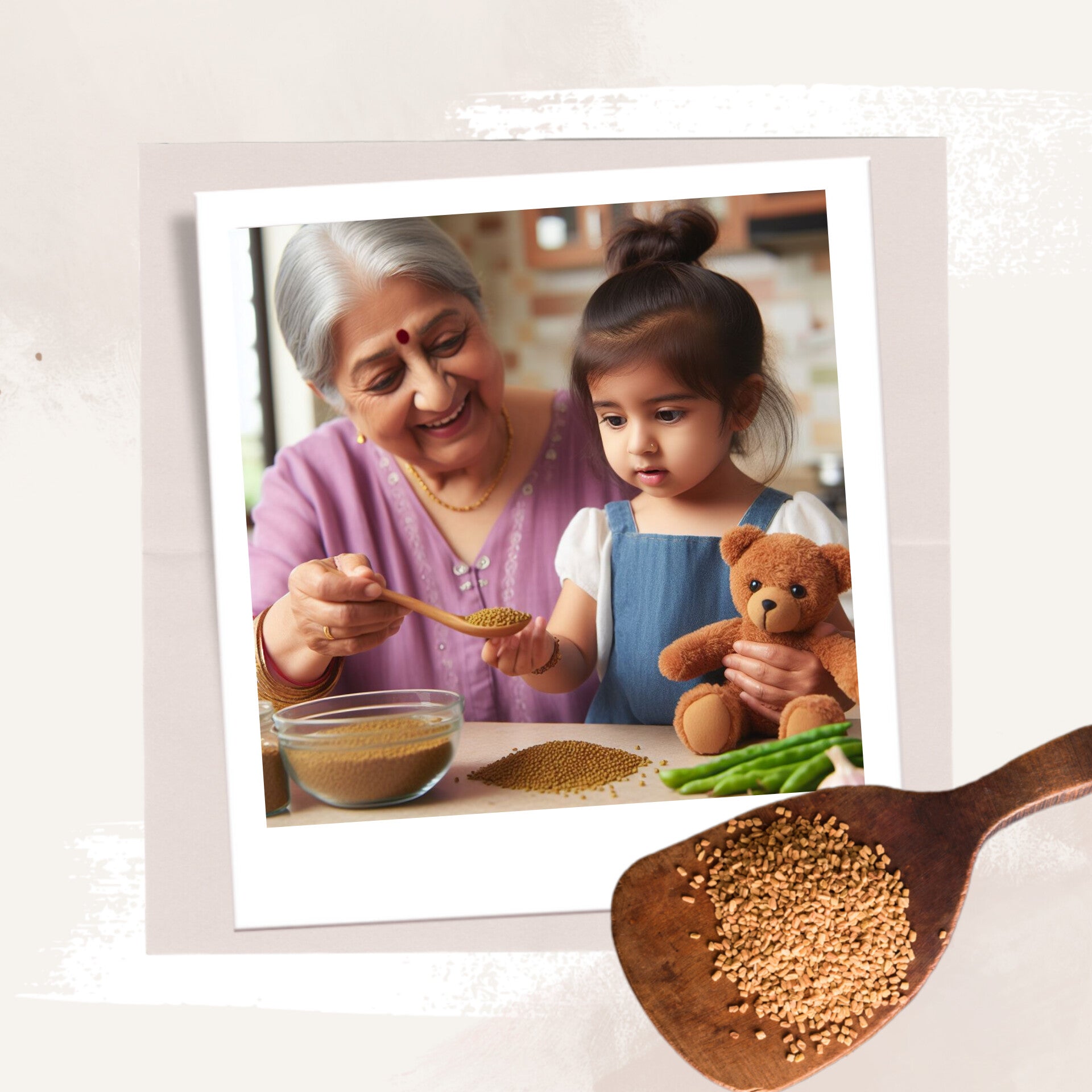
Grandma's Secret Superfood: Fenugreek Seeds(Methi) Unveiled by Modern Science!
As Meenu heard her grandma cooking, she dashed to the kitchen, teddy bear in hand, and asked with big eyes, "Dadimma, what's today's special?"
Looking down at the cute toddler, Grandma lovingly said, "Methi Ladoos."
"Ladoos?" Meenu's eyes widened with joy. Those sweet little balls are her favourite snacks!
"Methi ladoos? But Dadimma, what's methi?" With a smile still on her face, Grandma scooped up a spoonful of small, yellowish seeds from her spice box and showed her.
Meenu squinted at the little seeds and asked, "Is it sweet?"
"No, betta, it's a bit bitter," Grandma replied. Meenu looked disappointed, her face sad.
Grandma said, "You don't know! These tiny seeds are like magic beans!"
Meenu looked puzzled and curious. What's so special about these tiny seeds with a bitter taste?

Meenu's grandma is spot on! This magical spice, fenugreek or methi seeds, is a celebrated staple in Indian cuisine and a revered medicinal plant in Ayurveda. In fact, fenugreek seeds are common condiments found in almost every Indian home since ancient times.
This treasured ingredient from Grandma's spice box is among the oldest seeds used by humankind. It has been integral to Indian cuisine for more than 3000 years!
According to the renowned food historian K. T. Acharya, the first mention of methi seeds appeared in Sanskrit literature around 800 to 350 BC. In the Sanskrit language, it's referred to as Medhika or Chandrika. Fenugreek is called methi in Hindi, Oriya, Punjabi, and Bengali. It's known as vendayam or Venthayam, uluva, and Menthulu in Tamil, Malayalam, and Telugu, respectively.
Fenugreek seeds come from a herb scientifically called Trigonella foenum-graecum. Besides seeds, its leaves, shoots, and pods are extensively used in Indian cooking.

From snacks to curries to pulao, fenugreek is omnipresent in Indian cuisine. Fenugreek leaves are consumed as curry leaves, and in dried form, they become the magical spice Kasuri methi, a crucial ingredient in numerous Indian dishes!
With such a rich history as a culinary wonder, unsurprisingly, India is the leading producer of fenugreek seeds.
Its widespread usage in India is deeply rooted not only in our culinary heritage but also in the 5000-year-old healing tradition of Ayurveda.
Fenugreek: A Revered Ayurvedic Wonder!
In traditional medicine, fenugreek is used to improve lactation for new mothers, enhance hair quality, treat dry skin and poor appetite, cure fever, and more.
In the Ayurvedic text, ‘Bhavprakash Nighantu’, fenugreek seeds are described as one of the four seeds making up Chaturbeeja, along with Chandrashoor, Kalonji and Ajwain. Chaturbeeja is a combination prescribed for abdominal pain and bloating.
The Ayurvedic text Dhanvantari Nighantu, estimated to be written in the 10th century, prescribes methi seeds as a remedy for prameha disorder or increased blood sugar levels.
Its widespread usage of fenugreek herb and seeds in traditional medicine and cooking can be credited to its rich nutritional profile.
Nutritional Profile

Source: Health Encyclopedia, University of Rochester Medical Centre
Fenugreek seeds are rich in fibre, supporting gut health. They also contain proteins like globulin, beneficial for the liver; lecithin, aiding nerve healing; and albumin, promoting blood health. Fenugreek is packed with vitamins such as vitamins A, B1, B2, C and niacin.
In addition, it is a good source of calcium, sulfur, and phosphorus. This nutritional powerhouse is one of the extensively studied spices, with studies demonstrating many health benefits of fenugreek.
Let's explore some evidence-backed health benefits of fenugreek.
The Fenugreek in Modern Times: Health Benefits

1. Aids in the Reduction of Blood Sugar Levels
Fenugreek has a long history of use in diabetes treatment, and modern science is now validating this age-old wisdom.
2. Promotes Lactation in New Mother

An insightful 2019 study concluded that fenugreek enhances breast milk production among new mothers. Additionally, it has a positive impact on the birth weight of infants within the initial week of life, as noted in the study.
3. Reduces Cholesterol
Another significant benefit is its role in reducing cholesterol levels. The consumption of fenugreek may reduce total cholesterol and LDL levels.
4 . Possess Anti-Cancer Properties
In 2020, around 10 million deaths were caused by cancer, according to WHO. In this context, the anti-cancer properties of fenugreek become relevant.
A study published in PubMed, the National Library of Medicine, demonstrated that fenugreek seeds possess potent anti-cancer properties.
5. Reduces The Severity of Heartburn
The consumption of fenugreek may reduce the severity of heartburn, making it an ideal food source for people experiencing heartburn frequently.
6. Promotes Hair Growth

Fenugreek has been employed to enhance hair growth since ancient times, with grandmothers often applying fenugreek powder to hair for improved growth.
The list of health benefits mentioned above is not exhaustive, as fenugreek is a valued medicinal plant with wider academic interest.
With all these health benefits and nutritional components, are you wondering about how to add fenugreek seeds to your diet?
Let's go through some super tasty ways to add fenugreek to your diet plan.
Treats from Tradition: Tasty Ways to Add Fenugreek Seeds to Your Diet!
Methi Ladoo/ Fenugreek Laddu

Methi ladoo/ Fenugreek laddu is a delicious treat packed with nutrition. It's called Methi Dinkache Ladoo in the Saurashtra region and western India, which includes today's Maharashtra and Gujarat. Prepared using dry fruits, dates, poppy seeds, muskmelon seeds, whole grain flour, Gondh (Gum acacia), Kamaras, ginger powder, spices, and ghee, it is also known as Methichi Ladoo or Methi Dinkache Laadoo.
This Immunity-boosting laddu is a perfectly healthy sweet for everyone, specifically famous for mothers undergoing postpartum recovery.
Khatta Dhokla
This popular dhokla recipe comes from Gujarati cuisine. Khatta Dhokla is made up of rice, yellow chana dal, tsp fenugreek seeds, yoghurt, oil, coriander leaves, etc. If you are fond of dhokla, eating Khatta Dhokla is a tasty way to consume fenugreek.
Methi ki Launji
This traditional recipe from Rajasthan is a delicious sweet pickle made from fenugreek seeds, dates, and resins.
In addition, fenugreek seeds are added to dosa and idli batter as they aid fermentation. They are also a key component of the Bengali spice mix called panch phoron and play an integral role in tempering numerous curries. In the southern state of Kerala, fenugreek seeds are used to prepare "uluva kanji," a porridge eaten during the monsoon season known for its medicinal value. In the North Eastern part of India, fenugreek is used to make a popular vegetarian dish called Amitar Khar.

To sum it up, fenugreek is a celebrated ingredient across the length and breadth of India and is added to hundreds of Traditional recipe, including snacks, pooris, curries, pickles, rotis, etc.
Which is your favourite fenugreek recipe? Let us know in the comment section!
Fenugreek: A Timeless Superfood!
The extensive usage of fenugreek in our traditional recipes is a testament to the health-conscious approach incorporated into the Indian diet from time immemorial.
With benefits validated by scientific studies, fenugreek seeds are indeed a superfood deserving a place in your diet plan.
But Isn't it fascinating that our grandmothers' ingredients and advice are scientifically supported? Ever wondered how they derived such sound wisdom?
If you're seeking healthy recipes from grandma's kitchen, explore our laddubars!
Share

